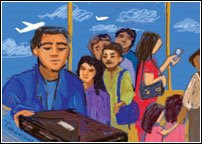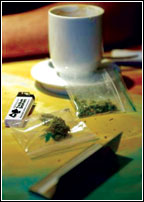
A tweaked version on an old blog which got published in The Review, Dawn.
At airports you get to meet the most interesting of characters who you would otherwise not encounter anywhere else, writes Tazeen Javed
If I ever end up becoming a person famous enough to write an autobiography (what’s wrong with a bit of wishful thinking?), a major part will be about the time I have spent at airports. Most of the time not only is my flight off schedule, I also get to meet the most annoying, strange and at times downright dense people at airports.
On my way to Islamabad recently, I saw an assorted variety of such creatures at the Karachi airport. The airports are usually busy in the mornings and there was a long queue in front of the scanner that was checking our bags. A man in a smart suit broke the line; when the airport security person asked him to get back in the queue he dismissed him very haughtily and said, in English of course, that he was sent in by ‘the office’ and was in a hurry.
The security guy backed off, but then I stepped in and asked, “Which office sent you to break the line?” Taken aback, he said, “The office at the back.”
Anyone who has ever been to Karachi airport knows that there is no 'office' at the back of the scanning station. The only thing at the ‘back’ is a long corridor that connects the waiting lounges to the boarding area. When I told him that there is no office at the back which could have instructed him to break the line and if he would get back in the line, it would save us all an unnecessary argument, he started foaming at the mouth and screaming about women who do not know their place. It was at that point that someone from airport security finally woke up and decided to deal with him. He was taken back to the office at ‘the back’ and we did not see him again.
While getting my handbag stamped by airport security people (it happens in Pakistan only, I don't see this practice anywhere in the West), I saw a couple of women teetering in unrealistically high heels and screaming at the security staff, their children and their respective maids in no particular order. One of them was in five-inch high heels, designer hijab and two inches thick layer of make-up. She had four children aged between six to 12. The poor maid who was holding the youngest and two bags also had to suffer the indignity of being shouted at by the eldest boy because she had put the boarding card in one of the bags and was holding up the queue. Mommy dearest had parked her ample self in one of the chairs and showed no interest in either taking care of the children or admonishing them for being publicly rude to the maid.
The other mom in high heels kept on writing text messages to someone and had two Philippino maids to take care of her twin daughters. When another woman commented on how beautiful her two little girls were, she gave her a blank look and then volunteered the most personal information. “Really, but I am not having any more babies, they are smelly and loud,” said the ever-texting-cellphone-addicted young mom.
Honestly, I don't get the Philippino maid/nanny fad that has engulfed everyone who has two extra pennies to rub. First of all, they are not trained nannies; most of them are from the rural part of their country with dubious hygiene and almost non-existent English language skills so their demand does not make much sense. Secondly, if one has to hire untrained rural nannies, what is wrong with the local Pakistani ones who at least know the language, but I digress.
I got up and went to one of the free Internet kiosks run by a telecom company and saw, what was probably the filthiest key board I ever laid my eyes on. I admit, it is quite admirable to offer free Internet services to weary travellers, but it would be even nicer if the key boards are wiped once in a while with some disinfectants to save the same weary travellers from contracting all kinds of communicable diseases.
While debating the hygienic risks of actually touching the keyboard, I heard the announcement that my flight was delayed by an hour — in incorrect English. Crushed as I was by the delay, I decided to look for the most deserted little corner where I would not run the risk of running into anyone I may know; I found that corner and dozed off — with the result that I almost missed my flight.
Bon voyage everybody.
.
